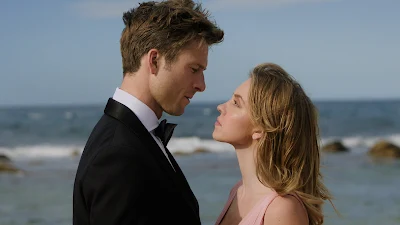This is a review of a fictional movie titled "Anyone But You." The narrative outlines the film's plot, characters, genre, and key elements such as romance, comedy, and visual aspects. It highlights the performances of the main actors, Glen Powell and Sydney Sweeney, while also emphasizing the film's attempts to subvert traditional romantic comedy tropes. The review concludes by noting the film's release status
As Hollywood witnessed a decline in mid-budget films during the 2010s, the romantic comedy genre appeared to be fading away. However, in 2018, Claire Scanlon and Katie Silberman's "Set It Up," featuring Glen Powell and Zoey Deutch, hinted at a potential revival. Fast forward five years, and the future of rom-coms remains uncertain. Yet, a new star-driven project starring the charismatic Powell, titled "Anyone But You," directed by Will Gluck and co-written by Ilana Wolpert, emerges as a beacon of hope. This film brings back the charm, wit, swoon-worthy romance, and, crucially, the star chemistry that has been notably absent from recent lackluster entries in the genre.
In this modern interpretation of Shakespeare's "Much Ado About Nothing," Glen Powell takes on the role of Ben, a finance professional masking deep emotional wounds with a nonchalant, carefree attitude. Ben's path crosses with Bea (played by Sydney Sweeney), a law student navigating uncertainties about her career choice. An instant spark ignites between the two, leading to a day and night filled with passionate conversations, shared grilled cheese meals, and an exchange of vulnerabilities rarely revealed to others. The morning after, a euphoric yet hesitant Bea hastily departs without a word. Consumed by regret, she soon returns to express her true feelings, only to overhear a wounded Ben confiding in his best friend Pete (GaTa) that she was merely another fleeting encounter with no significance to him.
Several months later, Ben and Bea's paths intersect once more as Pete's sister Claudia (played by Alexandra Shipp) initiates a relationship with Bea's sister Halle (Hadley Robinson). Another encounter unfolds about a year later, as they find themselves both invited to a destination wedding in Australia for the women. Amidst their bickering and chaos, the wedding party hatches a plan to bring Ben and Bea together to maintain harmony. Despite the initially poorly executed ruse, the duo decides to play along, hoping to put an end to Bea's parents' attempts to reunite her with childhood sweetheart Jonathan (Darren Barnet) and evoke jealousy from Ben's ex, Margaret (Charlee Fraser). However, as the saying goes about the best-laid plans, things take an unexpected turn, and, in the end, true love triumphs.
Similar to Gluck's millennial reimagining of "The Scarlet Letter" with "Easy A," which played a pivotal role in launching Emma Stone's career, "Anyone But You" revitalizes a classic story and structure through thoroughly contemporary characters and themes. Ben, encapsulated by f-boy nihilism, has erected emotional barriers around his life. On the other hand, Bea, a law student, grapples with the fear of stepping beyond the confines of the comfortable life meticulously planned by her helicopter parents (portrayed by Dermot Mulroney and Rachel Griffiths). Despite their constant interactions with the people around them, both Ben and Bea seldom dare to engage in meaningful communication, revealing the complexities of their characters in the process.
Despite the ensemble of supporting characters, the spotlight in "Anyone But You" truly belongs to Glen Powell, whose scruffy charm evokes memories of Kurt Russell in "Overboard," and Sydney Sweeney, whose melancholic gaze and soft voice bring to mind Melanie Griffith in "Working Girl." The palpable chemistry between them is expertly captured through medium and close-up shots, accentuating the fire within their characters and their shared sense of melancholy. While the film features its fair share of comedic moments, its true brilliance lies in scenes where Ben and Bea genuinely connect, finding the courage to embrace a relationship where someone sees them for who they truly are, flaws and all.
In addition to the compelling performances by Powell and Sweeney, one of the film's standout features is the creative visual approach taken by Gluck to defy expectations for an R-rated comedy. While there is nudity, the camera primarily focuses on Powell's toned physique. Gluck takes this gaze a step further by using the actor's imposing presence for comedic sight gags and lighthearted jabs. The director also positions Sweeney's petite frame in slightly absurd physical situations, showcasing the actress's own talent for slapstick humor—an example being a standout scene involving a malfunctioning sink early in the film.
These comedic interludes serve as a perfect counterpoint to the film's romantic moments, both grand and intimate, all of which cleverly subvert conventional tropes. From the recurring scenes of Ben preparing grilled cheese for Bea (a culinary expression of love, as nothing says love quite like a perfectly cooked sourdough grilled cheese) to Bea aiding Ben in overcoming fear by serenading him with Natasha Bedingfield's undeniably uplifting hit "Unwritten" (his designated "serenity song"). The movie also includes the obligatory final rush of love declaration. However, instead of the typical plea for the couple to remain together, as seen in swoon-worthy yet often ultimatum-laden endings of classic romantic films, there is a more emotionally nuanced realization that loving someone means wanting the best for them, even if that future doesn't necessarily include you. After all, as Natasha Bedingfield's song reminds us, the rest is still unwritten.
In theaters its Currently Playing

